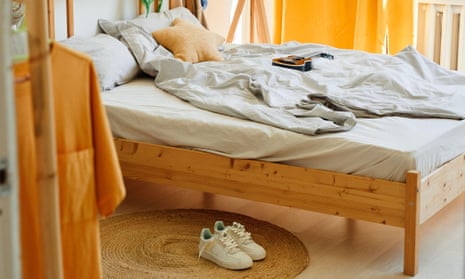The great migration happens every autumn. Salmon head upriver to spawn and die. Swallows leave their nests behind and fly back to Africa. And human parents all around the UK load their children’s belongings into bin bags and cardboard boxes and set out on the long drive to university. For a few weeks, the roads are full of cars making this journey and this year I was in one of them, taking my son up north to start his degree.
Before he left, I didn’t want to think about the yawning emptiness that his departure would leave in my home. I didn’t want to think, either, about the fact that after nearly two decades of his father and me being on hand to solve (almost) everything – the dental appointments, the last-minute lifts – he was going to be 200 miles beyond the reach of my interventions. I wanted even less to think about the fact that my interventions might actually not be needed anymore.
I worried, of course, but I didn’t want my son to see my worry and add it to his own. Instead, I thought about homewares. I scrutinised the things I had saved over the last few years “for uni” and decided none of them would do. (They would have been fine, probably. I just needed something to do.) I started shopping.
For a month, all my free time was spent making lists, rummaging through shops, haunting websites. Where would I find the exact potato masher that could convey a relaxed, breezy, “no big deal if you (or your flatmates) melt this!” attitude, while at the same time affirming my constant concern for his wellbeing?
“He’ll only eat instant anyway,” people said, trying to be helpful, as if mashing potatoes was ever really the point. In the end, I chose a brightly coloured one (casual) in robust silicone (caring) and no one will ever be able to see the meanings I’ve loaded on to its ergonomic handle. It is, after all, just a potato masher.
The collection of crockery and pans and cutlery heaped up and meanwhile his friends left town, one by one, until the Saturday morning arrived when it was his turn. He said goodbye to his little sister. “I’ll miss you,” she sniffed. “Are you leaving your Stüssy T-shirt?” He said goodbye to the dog, who looked pleased with the attention. And then we started the four-hour drive to a 1960s hall of residence, where we would leave him to start the rest of his life.
Four hours is a long time to spend in a car, but a short time to run through everything I might have failed to impart in my parenting up to now. Do you know to put meat on the bottom shelf of the fridge? Not to mix your white and coloured laundry and to always lock your door? Do you know that everyone else you’ll meet will probably be as nervous as you? Do you know that if you act friendly and confident, people will think that’s who you are?
We helped him unpack, said hello to some housemates. He used the kitchen scissors I’d given him to snip the ludicrous pom-pom trim from the edges of the bedding I’d bought and we laughed at the fact that I’d sent him to university with a clown duvet. If I got something wrong, at least it was funny. At least it was fixable. The potato masher got put away and then it was time to go.
He came outside to hug us goodbye and we watched him go back into the building, one last look, a wave. Parenting is a succession of those looks and waves. The one when you drop them off at nursery and feel your heart dragged out of your body as you walk unwillingly away. The one on the first day of school, as they race away in smart new shoes to start the next part of growing up. The one when they’re grown and starting out alone.
I can remember the first words and the first steps, but there’s another kind of first that felt equally momentous: the first time one of my children revealed something that they absolutely, positively hadn’t learned with me. A word picked up from a friend. A song they heard on TV. An idea they had all by themselves. Those small proofs that the person you made is going to far, far exceed the raw material you have provided.
Most of the worst frustrations of parenting come from the things you can’t control about your children. Being woken up in the middle of the night, which is equally an issue with hungry babies and with teenagers clattering home from the pub. The food they won’t eat. The times they just won’t listen. (I miss him, yes, but I don’t miss everything.) But this is also the point of it: to raise someone who is not merely a part of you, but their own self.
The aim of parenting is ultimately to be left behind. It’s just that those successes can sting a bit when they happen. On the way home, my husband and I took turns reassuring each other. I told him that our son was ready for independence; he told me that it didn’t matter if I’d packed the wrong cheesegrater. Our son would cope. We would cope. At least, until reading week.
